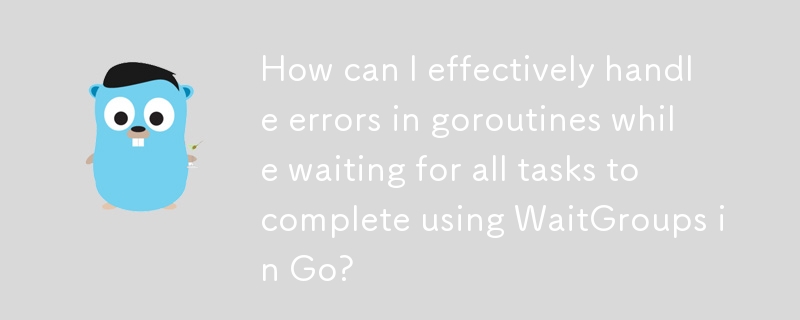Home >Backend Development >Golang >How can I effectively handle errors in goroutines while waiting for all tasks to complete using WaitGroups in Go?
How can I effectively handle errors in goroutines while waiting for all tasks to complete using WaitGroups in Go?
- Patricia ArquetteOriginal
- 2024-10-30 02:59:03450browse

Error Handling and Terminating Goroutines with WaitGroup
In Go, Goroutines provide concurrency and parallelism, while WaitGroups facilitate waiting for multiple concurrent tasks to complete. However, handling errors within goroutines, especially in conjunction with WaitGroups, can be challenging.
To gracefully handle errors in your goroutine-based code, consider utilizing the golang.org/x/sync/errgroup package. This package provides a Group type that simplifies error handling for goroutines.
Here's how you can adapt your example to handle errors using errgroup:
<code class="go">package main
import (
"errors"
"log"
"golang.org/x/sync/errgroup"
)
const totalGoroutines = 10
func main() {
c := make(chan int, totalGoroutines)
var g errgroup.Group
// Add goroutines to the errgroup
for i := 0; i < totalGoroutines; i++ {
g.Go(func() error {
return doSomething(c)
})
}
// Wait for all goroutines to complete and handle any errors
if err := g.Wait(); err != nil {
log.Fatal(err)
}
close(c)
}
func doSomething(c chan int) error {
for i := 0; i < totalGoroutines; i++ {
n, err := someFunctionThatCanError()
if err != nil {
return err
}
c <- n
}
return nil
}
func someFunctionThatCanError() (int, error) {
return 1, errors.New("an error")
}</code>
In this modified code:
- We create an errgroup.Group that will track the execution of goroutines.
- Instead of adding goroutines to the WaitGroup, we add them to the errgroup.
- The errgroup.Wait() method waits for all goroutines to complete and returns the first non-nil error encountered.
- If an error occurs during a goroutine execution, it will be captured by the errgroup and returned by Wait().
- The main goroutine checks for errors returned by Wait() and exits if an error occurs.
This approach allows for centralized error handling and graceful termination of goroutines. The errgroup simplifies error management and eliminates the need for manual error handling within the WaitGroup.
The above is the detailed content of How can I effectively handle errors in goroutines while waiting for all tasks to complete using WaitGroups in Go?. For more information, please follow other related articles on the PHP Chinese website!
Related articles
See more- How Can I Create a Slice of Functions with Different Signatures in Go?
- Can XML be Unmarhaled Directly into a Go Map to Improve Performance?
- Can Go Perform Pointer Arithmetic Like C, and Why Does It Matter?
- How to Access Query Strings in Go's HTTP POST Requests?
- Why Does Go Return 'Can't Load Package: Package my_prog: Found Packages my_prog and main'?

